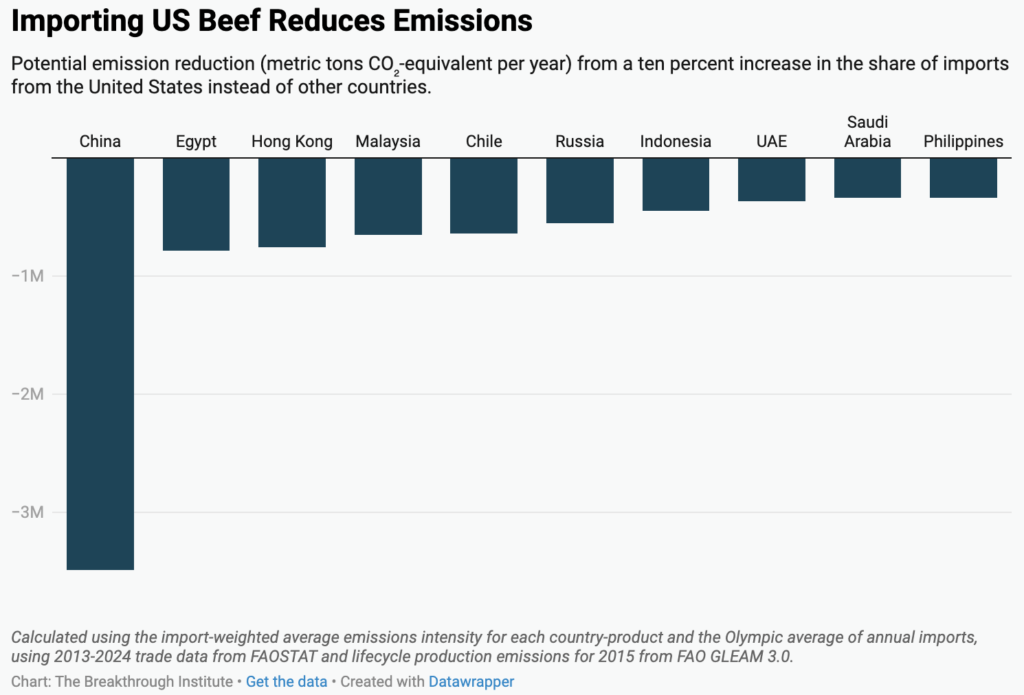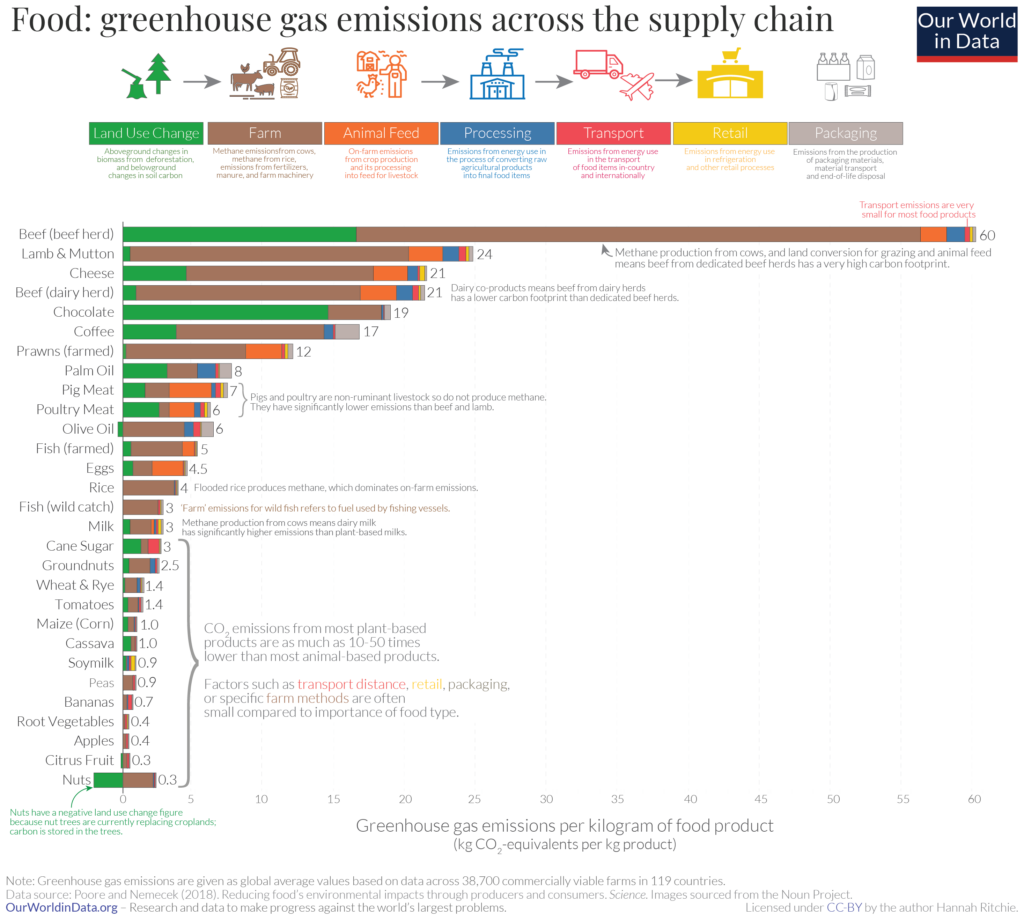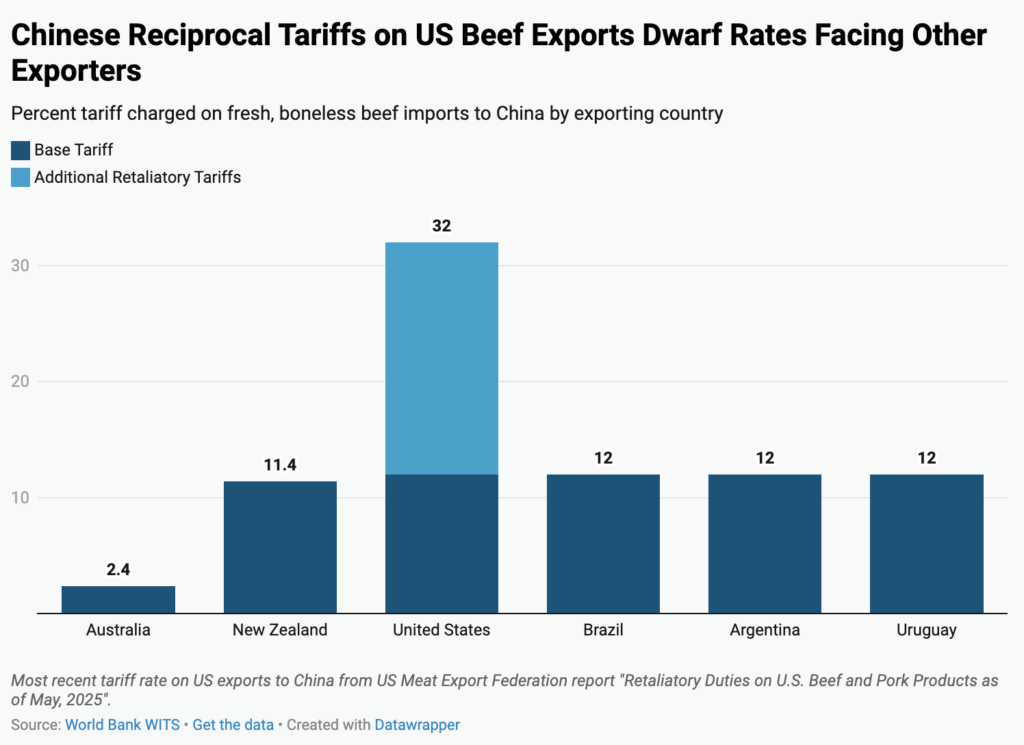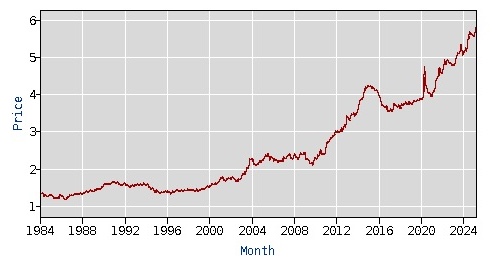
Increasing US exports of beef can help lower the industry’s emissions across the globe, but protectionist barriers and tariffs must be overcome first.
By displacing China’s imports of South American beef with its own, the US could help accomplish significant reductions in global cattle emissions, according to new analysis by the Breakthrough Institute.
Figures from the UN Food and Agriculture Organization show that American beef has just a quarter of the carbon footprint of Brazilian beef, and half that of Argentinian beef. Unfortunately for global emissions, imports from the latter two countries have steadily increased in China just as US producers have had their access restricted, fuelling the industry’s already outsized climate impact.
Beef is the most polluting food on Earth, generating twice as many emissions as the next worst food (dark chocolate). According to data cited by the Breakthrough Institute, beef production is responsible for around roughly 6% of all global emissions – that’s three times higher than the entire aviation industry.
A primary cause of its climate footprint is methane, a shorter-lived gas than carbon, but 84 times more potent on a 20-year timeline. This is thanks to cattle’s digestive processes, called enteric fermentation. Since they are ruminant animals, they have specialised digestive systems, allowing them to digest foods that humans and most other animals can’t.
When food enters their stomach, microbes and bacteria break down the particles, which ferment in a part of the stomach called the rumen. As this process takes place, these food particles produce methane. Every time cows belch or flatulate, they emit methane into the atmosphere.
According to the analysis, an increase of 10 percentage points in the US’s share of beef imports in China would have the largest emissions benefit for the beef industry.

Locally sourced beef isn’t better than imported
At the heart of the argument is the misconception that locally produced foods are inherently better for the planet than imported products that travel long distances. In fact, research shows that the impact of transportation plays a much smaller role in a food’s carbon footprint than how it is produced.
Take Chile, for example. Over 95% of beef imports come from Paraguay, Brazil, Argentina, and Uruguay, whose average emissions intensity of production is 43kg of CO2e per kg of beef – that’s three times higher than that of the US (16kg of CO2e per kg), which only provides up to 1% of Chile’s imports.
The difference in shipping emissions is “paltry”. A kg of beef shipped from Seattle to San Antonio would lead to about 0.22kg of CO2e of shipping emissions, less than 1% of the carbon advantage from more efficient US production practices.
These practices involve intensive, feedlot-based systems, leading cattle genetics, and grain-supplemented diets, which make the US’s beef “among the world’s most carbon-efficient”.
However, it has faced several export barriers over the years, which the analysts describe as “protectionist sanitary or veterinary requirements that are out of step with international science”.

The US was once China’s largest beef supplier, but the East Asian country banned imports after mad cow disease was detected, and kept the ban in place long after it was eradicated. This made room for Brazil and Argentina, whose import share grew rapidly. The US made up only 5% of China’s beef imports last year, and this has further fallen this year as over half of American meatpackers’ licences to export to China expired.
China also currently bans beef with residues of ractopamine, a growth-enhancing feed additive frequently used in the US, though the authors point out the WHO considers it safe under set levels. That hasn’t stopped other Asian countries, like Thailand, from following suit with such a policy.
Why beef (and tariffs) need to be addressed

While these non-tariff bans are the main obstacle for the US’s beef exports, tariff reductions also offer significant climate benefits. Until recently, US producers were subject to a 12% tariff; amid the drama of President Donald Trump’s trade war, this has risen to 32%, allowing other beef exporters to dominate. China’s beef imports have grown fivefold in the last decade, sourced mainly from Brazil and Argentina, whose beef is way more carbon-intensive.
“Negotiating a reduction in China’s beef tariffs that restores a level playing field or provides the US with preferential trade status… may represent the largest climate mitigation opportunity in global agricultural trade,” the Breakthrough Institute’s authors write, though they acknowledge it is unlikely the two administrations will get to that point as things stand.
“But, if the US could secure the same share of imports held by New Zealand or Australia in 2023, the emissions benefit would be substantial, potentially preventing 874,000 to 1.58 million tons of greenhouse gas emissions annually,” they explain.

As herd numbers shrink and beef prices reach record highs, US ranchers are rebuilding their herds to boost production in the next four to five years, and attaining China as a market for that trade would be the best path forward from a climate perspective.
The authors believe US livestock producers have long faced “discriminatory trade practices”, with countries restricting imports via “import licensing, bans on hormone use, or high tariffs”. Then, as demand continues to rise, they turn to imports from less efficient producers.
Outlining the elephant in the room, the Breakthrough Institute does concede that beef is often thought of as a climate villain – given its high methane emissions, extensive land use, and intensive feedlot practices, that is justified too.
“Until billions of people decide that they will forego ribeyes, burgers, and brisket, the impacts of beef will remain significant,” they point out. “Reducing those impacts will require creative solutions that take advantage of technology, efficiency, and comparative advantage.”
Indeed, while eliminating beef production is really the goal for many climate activists, that isn’t a realistic option. Some have advocated for a shift towards “less and better meat”, which has helped propel startups working to reduce beef’s methane impact and producing blended meat by combining it with plant-based ingredients.
The post Could Trump Deliver ‘Rare Win’ for Meat & the Climate with US Beef Exports? appeared first on Green Queen.
This post was originally published on Green Queen.